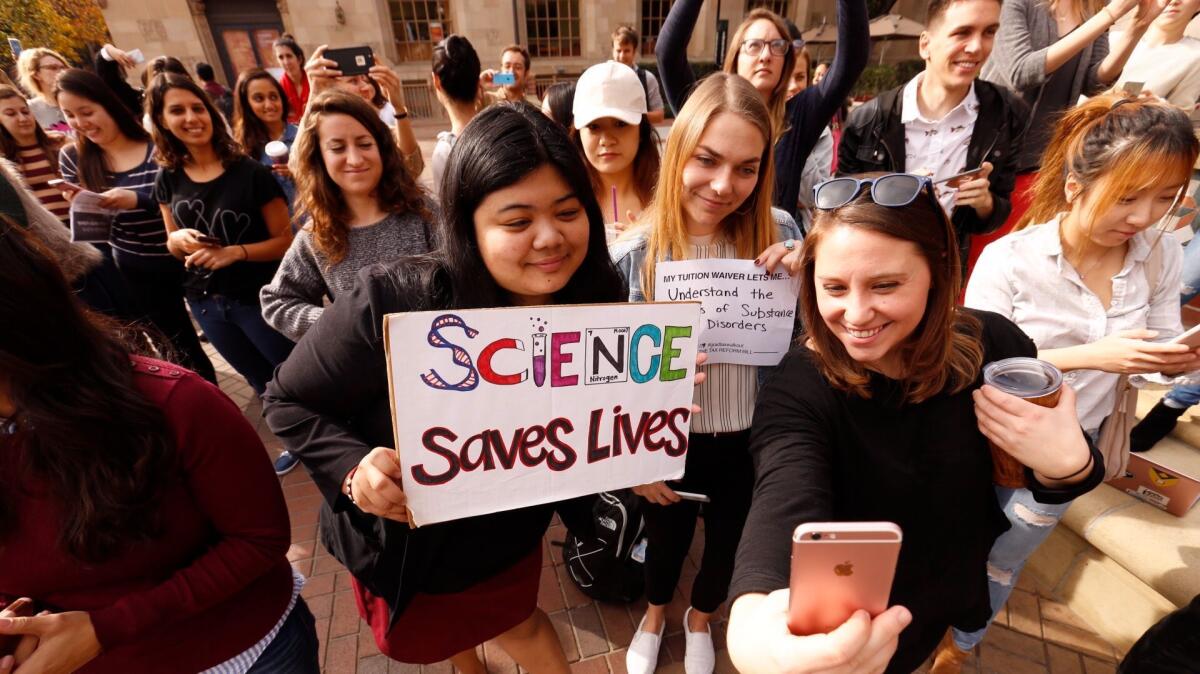Graduate students nationwide protest House tax bill, saying it could cost them thousands

Rashad Ahmed left his high-paying job on Wall Street for USC, where he’s using economic research to help tackle social problems such as homelessness. At UCLA, Emily Yen is studying the environmental justice movement in Long Beach and Los Angeles. And at Caltech, Celeste Labedz is using seismology to understand glaciers.
But the doctoral students say their work and the important research of graduate students nationwide are in jeopardy if changes in House Republicans’ tax bill become law. The House version of the tax bill, passed this month, would repeal a decades-old provision that has shielded graduate tuition from taxation, potentially increasing student tax bills by as much as $10,000 a year.
On Wednesday, the three researchers joined thousands of graduate students at nearly 60 campuses in 33 states to protest the tax bill. Hannah Khoddam and a handful of her classmates at USC began organizing the walkout this month and then joined forces with students from six East Coast colleges to sponsor a national day of action.
Universities often waive graduation tuition in exchange for students’ work as teaching assistants and researchers. The House bill views that tuition as income.
“If my tuition waiver were to be taxed, it would make getting this PhD essentially unaffordable,” Labedz said. “I would either have to quit or go into massive debt or go somewhere else in the world if I want to get this degree and make a difference in this world like I want to.”
The House tax bill would slash $65 billion in tax benefits for higher education over 10 years, according to Steven Bloom of the American Council on Education.
A UC Berkeley analysis found that if Berkeley’s $13,793 annual tuition benefit became taxable, the university’s graduate students’ taxes would rise by 61%, or about $1,400, for a campus teaching assistant, and 31%, or about $1,100, for a research assistant. At MIT, a private institution that charges about $49,600 in annual tuition, taxes would more than triple to $13,577, said the analyst, Vetri Velan, a PhD student in physics.
Velan and fellow student Kathy Shield created a calculator to figure out how the change, if it became law, would affect students’ taxes.
Bloom said the longtime provision benefited 145,000 graduate students in 2011-12. About 60% of them, he said, were studying science, technology, engineering and math — areas of critical need to drive the nation’s economy.
Some of the nation’s brightest STEM students protested at Caltech in an unusual display of campus political activism. Several said they feared tax increases would cause a brain drain of American researchers fleeing to Europe. Asked how many would consider going abroad, more than half of the roughly 70 Caltech student protesters raised their hands.
The tax hikes could close off graduate education to all but the wealthy, said Emily Yen, a PhD student in sociology at UCLA, where about 250 graduate students protested Wednesday.
“The UC system has prized itself on diversity — its first-generation, low-income students — and this is just going to reverse all these gains,” said Yen, president of the UC Student-Workers Union (UAW 2865).
Such worries have meant sleepless nights for Mariel Bello, a USC doctoral student in clinical psychology who hopes her research will improve addiction treatment in low-income communities. The daughter of Filipino immigrants and the first in her family to attend college, Bello already stretches her $35,000 graduate student stipend to support her parents and younger brother on top of her research and housing costs.
As she started to do the math, tears welled up.
“I would have to drop out,” she said. “If this tax bill passes, I can’t support anyone, I can’t even support myself.”
According to information provided by the University of California, about 23,000 UC graduate students earned $250 million in tuition benefits in 2015-16. Students protested at all nine of UC’s undergraduate campuses Wednesday.
At USC, more than 100 graduate students and faculty members rallied at the bronze statue of Tommy Trojan, chanting “Kill this bill!” and waving colorful signs: “Graduate students study food safety,” “Graduate students design highways.”
USC Provost Michael Quick said the university was exploring legal options to minimize the impact on the school’s 3,100 PhD students, whose tax bills could triple or quadruple if the change went into effect.
Those forced to take out student loans to cover higher tax bills would suffer a double whammy if another change in the House bill also made it into law. The bill would repeal the deduction for interest on student loans, which 12 million taxpayers claimed in 2015.
The Senate has yet to pass its tax bill. Once it does, the differences between the two bills would need to be resolved. The Senate bill does not contain the changes the students are protesting.
And students hope to keep it that way by making sure senators hear them. USC doctoral student Marie Gillespie stood before the growing crowd on her campus Wednesday and asked everyone to hold out their cellphones.
“This is our voice,” she told them. “Everybody right now take a photo, snap a selfie, post it on social media. Call your senators. Protest the tax reform bill. Are you with me?”
All around her, students and faculty raised their phones, snapped and cheered.
Twitter: @teresawatanabe
Twitter: @RosannaXia
More to Read
Sign up for Essential California
The most important California stories and recommendations in your inbox every morning.
You may occasionally receive promotional content from the Los Angeles Times.












